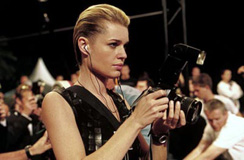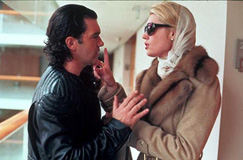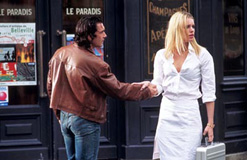Femme Fatale (Brian DePalma) 2002
 Brian DePalma’s Femme
Fatale is an odd, fascinating movie. Few films flirt so audaciously with
genuine ideas only to present their most obvious pleasures in the superficial.
It’s tough to decide if DePalma is incapable of a more in-depth probing of his
subject matter here, which most prominently investigates the objectification and
empowerment of women, or if he’s simply not willing to do so in a typically
didactic, speech-laden way. There
are a multitude of themes running throughout, most of which have surfaced in the
director’s previous work, and most of them are conveyed mainly in visual terms
with rhyming images and tracking shot connections. The opening scene, for
example, links the Barbara Stanwyck character (quite arguably the prototype for
the modern femme fatale) from the Billy Wilder classic Double Indemnity with Laure (Rebecca Romijn-Stamos), the film’s
protagonist, creating a sexist, absurd audience expectation of her behavior that
the rest of the film spends attempting to triumphantly brush off.
Brian DePalma’s Femme
Fatale is an odd, fascinating movie. Few films flirt so audaciously with
genuine ideas only to present their most obvious pleasures in the superficial.
It’s tough to decide if DePalma is incapable of a more in-depth probing of his
subject matter here, which most prominently investigates the objectification and
empowerment of women, or if he’s simply not willing to do so in a typically
didactic, speech-laden way. There
are a multitude of themes running throughout, most of which have surfaced in the
director’s previous work, and most of them are conveyed mainly in visual terms
with rhyming images and tracking shot connections. The opening scene, for
example, links the Barbara Stanwyck character (quite arguably the prototype for
the modern femme fatale) from the Billy Wilder classic Double Indemnity with Laure (Rebecca Romijn-Stamos), the film’s
protagonist, creating a sexist, absurd audience expectation of her behavior that
the rest of the film spends attempting to triumphantly brush off.
 After establishing the grounds for his thesis, DePalma,
with his usual brazen bravado, allows us the fun of watching Laure test out the
mold that Stanwyck has made. By hilariously parodying the overblown secret-agent
antics of his own Mission: Impossible,
he casts Laure into the suddenly stereotypical Laura Craft female action hero
mode, pushing both her sexuality and capability for deception farther than any
other director might dare. Powered by a dreamy, floating camera, lesbian
wish-fulfillment, and more phallic symbolism than you can shake a stick at, the
sequence is a hackneyed male fantasy cum reality through the magic of the
movies. It’s the anachronistic Cannes 2001 setting (where East-West is oddly playing and the more appropriate choice of Mulholland
Dr. oddly isn’t) of this heist that most heavily clues the audience into
the movie’s other prime concern, which is an examination of the layers that
exist, or don’t, between fantasy and reality.
Even in this relatively inconsequential, but thrilling, opening sequence,
he tests the audience’s ability to accept coincidence and contrivance as he
crafts an intricate web of narrative event for Laure to steer herself through on
the road to some sort of liberation.
After establishing the grounds for his thesis, DePalma,
with his usual brazen bravado, allows us the fun of watching Laure test out the
mold that Stanwyck has made. By hilariously parodying the overblown secret-agent
antics of his own Mission: Impossible,
he casts Laure into the suddenly stereotypical Laura Craft female action hero
mode, pushing both her sexuality and capability for deception farther than any
other director might dare. Powered by a dreamy, floating camera, lesbian
wish-fulfillment, and more phallic symbolism than you can shake a stick at, the
sequence is a hackneyed male fantasy cum reality through the magic of the
movies. It’s the anachronistic Cannes 2001 setting (where East-West is oddly playing and the more appropriate choice of Mulholland
Dr. oddly isn’t) of this heist that most heavily clues the audience into
the movie’s other prime concern, which is an examination of the layers that
exist, or don’t, between fantasy and reality.
Even in this relatively inconsequential, but thrilling, opening sequence,
he tests the audience’s ability to accept coincidence and contrivance as he
crafts an intricate web of narrative event for Laure to steer herself through on
the road to some sort of liberation.
 Since Femme Fatale presents
Laure’s moral discovery without betraying the rules of the suspense film, it
never feels too earnest or cloying. Instead it comes off as a simultaneous
celebration of the potential of the genre to thrill and a justification for what
compels him to work in it. Throughout Femme
Fatale, DePalma, per usual, references many other movies, but the nods that
have the most impact are the allusions to his own work. The scene where Laure is
followed to a hotel explicitly recalls a similar moment in his Body
Double (itself reminiscent of Hitchcock’s Rear
Window). The split-screen technique used in several sequences, in which the
camera is literally torn into two because it’s equally interested in the
voyeur and the subject of voyeurism, echoes his early film Sisters.
A graphic, slow-motion impalement seems to have been lifted from his Raising
Cain. The cumulative effect of these references when coupled with Laure’s
redemption through exploitation, turn the film into an exciting game of
self-observation for DePalma. The movie leaves a strong impression that DePalma
sees his willingness to deal with the issues in his films as a sort of cathartic
release that keeps him from feeling compelled to explore them in reality.
Filmmaking allows him to act out his wildest fantasies just as Laure is allowed
to temporarily toy with the mantle of the femme fatale in this movie. Perhaps
more than any film he’s made up to this point, Femme Fatale is
DePalma’s most humanistic defense of his body of work, but only a director with
his unique obsessions and talents could make a statement of humanism that’s so
provocative, sexy, and exciting.
Since Femme Fatale presents
Laure’s moral discovery without betraying the rules of the suspense film, it
never feels too earnest or cloying. Instead it comes off as a simultaneous
celebration of the potential of the genre to thrill and a justification for what
compels him to work in it. Throughout Femme
Fatale, DePalma, per usual, references many other movies, but the nods that
have the most impact are the allusions to his own work. The scene where Laure is
followed to a hotel explicitly recalls a similar moment in his Body
Double (itself reminiscent of Hitchcock’s Rear
Window). The split-screen technique used in several sequences, in which the
camera is literally torn into two because it’s equally interested in the
voyeur and the subject of voyeurism, echoes his early film Sisters.
A graphic, slow-motion impalement seems to have been lifted from his Raising
Cain. The cumulative effect of these references when coupled with Laure’s
redemption through exploitation, turn the film into an exciting game of
self-observation for DePalma. The movie leaves a strong impression that DePalma
sees his willingness to deal with the issues in his films as a sort of cathartic
release that keeps him from feeling compelled to explore them in reality.
Filmmaking allows him to act out his wildest fantasies just as Laure is allowed
to temporarily toy with the mantle of the femme fatale in this movie. Perhaps
more than any film he’s made up to this point, Femme Fatale is
DePalma’s most humanistic defense of his body of work, but only a director with
his unique obsessions and talents could make a statement of humanism that’s so
provocative, sexy, and exciting.
* * * *
11-14-02
Jeremy Heilman